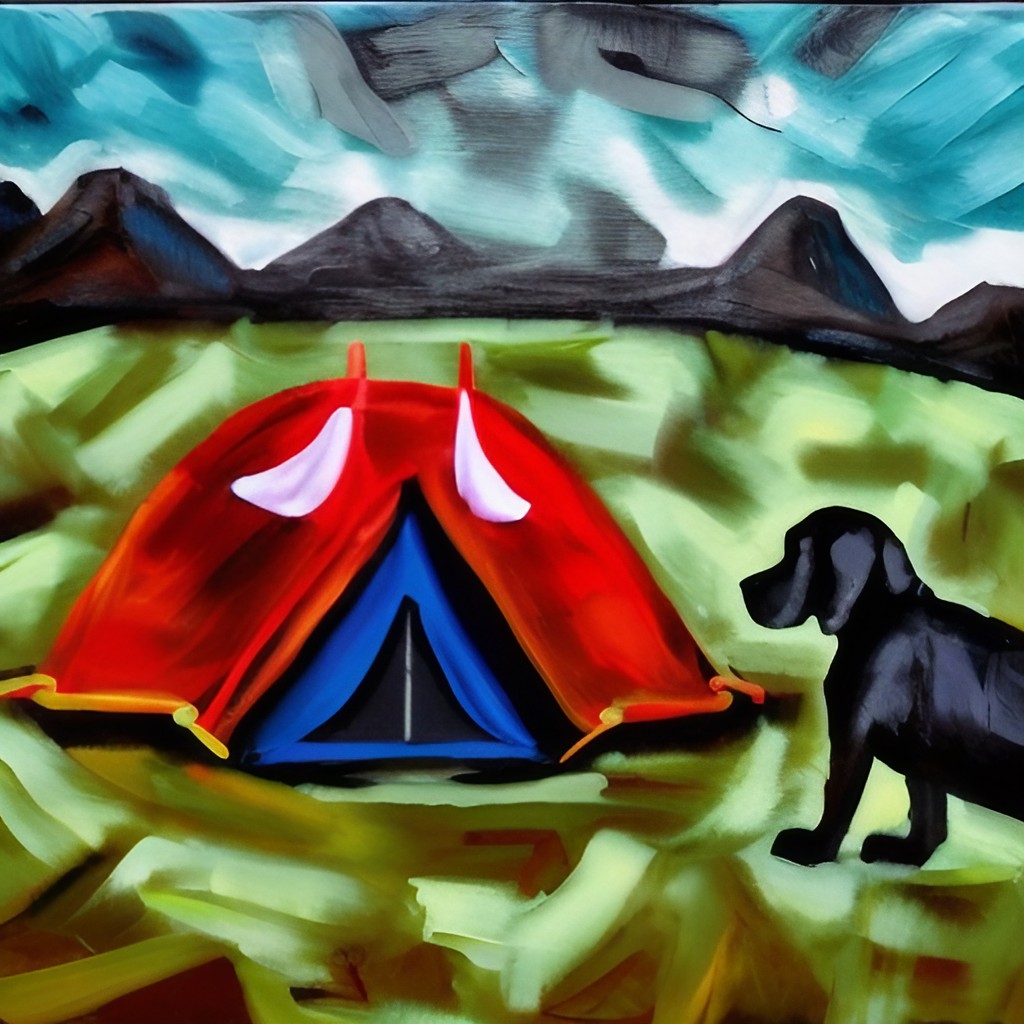
Tent camping is a great way to escape from the hustle and bustle of daily life and enjoy the great outdoors. But what if you want to bring your furry friend along for the adventure?
Camping with dogs can be a lot of fun, but it also requires some extra planning and preparation to ensure you and your dog have a safe and enjoyable experience.
In this article, we’ll share 15 tips for tent camping with dogs, from choosing a dog-friendly campground to packing the right gear and keeping your dog safe and comfortable in the great outdoors. Whether you’re a seasoned camper or a first-time adventurer, these tips will help you and your four-legged companion have an unforgettable camping trip together.
- Why You Should Bring Your Dog Camping – Tent Camping with Dogs
- 1. Make Sure Your Dog is Comfortable with Camping – Tent Camping with Dogs
- 2. Choose a Dog-Friendly Campground – Tent Camping with Dogs
- 3. Keep Your Dog on a Leash – Tent Camping with Dogs
- 4. Bring a Tent that is Big Enough for You and Your Dog – Tent Camping with Dogs
- 5. Bring a Comfortable Dog Bed – Tent Camping with Dogs
- 6. Pack Enough Food and Water for Your Dog – Tent Camping with Dogs
- 7. Bring a First Aid Kit for Your Dog – Tent Camping with Dogs
- 9. Keep Your Dog Away From Campfires – Tent Camping with Dogs
- 10. Bring Plenty of Waste Bags for Your Dog’s Poop – Tent Camping with Dogs
- 11. Make Sure Your Dog is Up-to-Date with Vaccinations – Tent Camping with Dogs
- 12. Check for Ticks Regularly – Tent Camping with Dogs
- 13. Bring Toys for Your Dog – Tent Camping with Dogs
- 14. Ensure Your Dog Does Not Disturb Other Campers – Tent Camping with Dogs
- 15. Respect the Environment and Practice “Leave No Trace” – Tent Camping with Dogs
- Conclusion – Tent Camping with Dogs
- Frequently Asked Questions – Tent Camping with Dogs
Why You Should Bring Your Dog Camping – Tent Camping with Dogs
Bringing your dog along on a camping trip can provide a range of benefits for you and your furry friend.
Here are some of the main benefits of camping with dogs:
- Quality Time: Camping with your dog allows you to spend quality time together in a beautiful outdoor environment. You can explore nature together, take long walks, and relax by the campfire. This can strengthen your bond and create cherished memories that will last a lifetime.
- Exercise: Camping provides plenty of opportunities for training and outdoor activities. Dogs need regular exercise to maintain their health and well-being, and camping can offer an exciting change of scenery and plenty of space to run, play, and explore.
- Mental Stimulation: Dogs also need mental stimulation, and camping can provide plenty of new sights, sounds, and smells to keep them engaged and stimulated. This can help reduce boredom and anxiety in your dog and keep them happy and healthy.
- Exposure to Nature: Camping with your dog provides an excellent opportunity for your furry friend to experience nature up close. Dogs are natural explorers and enjoy sniffing and investigating new environments. Exposing them to the natural world can also help them develop a deeper appreciation and respect for the environment.
- Stress Relief: Camping can be a great way to reduce stress and unwind from the pressures of daily life. Spending time in nature can have a calming effect on both you and your dog and help reduce anxiety and tension.
- Socialization: Camping can allow your dog to socialize with other dogs and people. Many campgrounds have dog-friendly amenities and activities, such as dog parks and hiking trails, to help your furry friend make new friends and enjoy new experiences.
In summary, camping with your dog can provide numerous benefits for both you and your furry friend. It can strengthen your bond, provide exercise and mental stimulation, expose your dog to nature, reduce stress, and provide opportunities for socialization.
With proper planning and preparation, camping with your dog can be a fun and rewarding experience that you both will enjoy. So without further ado, let’s dive right into the 15 most important tips for camping with your dog.
1. Make Sure Your Dog is Comfortable with Camping – Tent Camping with Dogs
It is essential to ensure your dog is comfortable with camping before taking them on a camping trip. Camping can be a new and unfamiliar experience for dogs, and it is important to ensure they are comfortable with the environment and the activities involved. Dogs uncomfortable with camping can become stressed, anxious, or even aggressive, which can spoil the trip for you and your furry friend.
To ensure your dog is comfortable with camping, it is a good idea to start with short hikes or camping trips in familiar surroundings. This can help your dog get used to being outdoors, sleeping in a tent, and being around other people and animals. You can also gradually introduce your dog to camping gear, letting them sniff and investigate the tent, sleeping bag, and other equipment.
Another critical factor is to make sure that your dog is physically able to handle camping. If your dog has health or mobility problems, it may not be a good idea to take them camping, as the environment can be challenging, and there may not be easy access to veterinary care.
In summary, it is crucial to ensure your dog is comfortable with camping before taking them on a trip. This can help ensure they enjoy the experience and remain happy and healthy throughout the trip. With proper preparation and attention to your dog’s needs, camping can be a fun and rewarding experience for you and your furry friend.
2. Choose a Dog-Friendly Campground – Tent Camping with Dogs
Choosing a dog-friendly campground is important when planning a camping trip with your furry friend. Not all campgrounds allow dogs, and those that do may have specific rules and restrictions that you need to be aware of.
A dog-friendly campground will have amenities and facilities that cater to dogs, such as dog parks, hiking trails, and pet-friendly cabins or campsites. They may also have rules and regulations regarding dogs, such as leash requirements, restrictions on the number of dogs per campsite, and designated areas for dogs to do their business.
Choosing a dog-friendly campground can also help ensure the safety of your dog. Dogs that are not used to camping or being in unfamiliar surroundings may be more prone to getting lost or injured, and a dog-friendly campground can help minimize these risks.
Furthermore, a dog-friendly campground can allow your furry friend to socialize with other dogs and people. This can benefit their mental and social well-being and make the camping trip more enjoyable for you and your dog.
In summary, choosing a dog-friendly campground is essential for ensuring your furry friend’s safety, comfort, and enjoyment on a camping trip. A dog-friendly campground can provide the amenities, facilities, and rules necessary to accommodate dogs and opportunities for socialization and interaction with other dogs and people. By choosing a dog-friendly campground, you can help make your camping trip a fun and memorable experience for both you and your furry companion.
3. Keep Your Dog on a Leash – Tent Camping with Dogs
Keeping your dog on a leash is important for several reasons when camping.
Firstly, it helps ensure the safety of your dog and other campers. In an unfamiliar environment, dogs can become easily excited or agitated and may be likelier to run off or approach other people or animals. A leash can help you control your dog and prevent them from getting into potentially dangerous situations or causing harm to other campers or wildlife.
Secondly, keeping your dog on a leash can help prevent them from getting lost or separated from you. Even well-trained dogs can get spooked or distracted by unfamiliar surroundings, and a leash can help you keep them close and prevent them from wandering off.
Thirdly, many campgrounds have rules and regulations regarding dogs, and keeping your dog on a leash can help you comply with these rules. Some campgrounds may require dogs to be on a leash at all times, while others may have designated off-leash areas. Following the rules and keeping your dog on a leash can help maintain a peaceful and enjoyable environment for all campers.
Finally, keeping your dog on a leash can help prevent them from disturbing wildlife or damaging the environment. Off-leash dogs may be more likely to chase or scare wildlife, which can disrupt their habitats and cause harm to both the animals and the environment. By keeping your dog on a leash, you can help minimize the impact of your presence on the natural surroundings and help preserve the beauty and integrity of the wilderness.
In conclusion, keeping your dog on a leash is important when camping for several reasons. It helps ensure their safety and the safety of other campers, prevents them from getting lost or separated, helps comply with campground rules and regulations, and minimizes the impact on wildlife and the environment. Keeping your dog on a leash can help create a safe and enjoyable camping experience for everyone involved.
4. Bring a Tent that is Big Enough for You and Your Dog – Tent Camping with Dogs
When camping with your furry friend, it is important to bring a tent that is big enough for both of you. A tent that is too small can be uncomfortable and cramped for you and your dog, leading to a less enjoyable camping experience.
Having enough space in the tent is essential for several reasons. Firstly, it allows you and your dog to stretch out and get comfortable, which can help you both get a good night’s sleep and feel refreshed for the next day’s activities. Secondly, a larger tent can provide space for storing your camping gear and keeping it organized, which can help make the camping experience more pleasant and less stressful.
Another benefit of bringing a tent that is big enough for you and your dog is that it provides a comfortable and secure space for your furry friend. Dogs used to sleeping indoors or in their own beds may feel anxious or uncomfortable sleeping in a small tent, and having a larger space can help them feel more at ease. It also allows them to have their own space within the tent, which can help them feel secure and calm.
Finally, having a larger tent can provide you and your dog with a comfortable and cozy environment to spend time in together. Camping is an excellent opportunity to bond with your furry friend and enjoy the outdoors together, and having a comfortable and spacious tent can help facilitate this experience.
In conclusion, bringing a tent that is big enough for you and your dog is vital for ensuring a comfortable and enjoyable camping experience. It provides enough space for you both to get comfortable, store your gear, and feel secure, and it allows you to spend quality time together in a cozy and relaxed environment. By choosing an appropriately sized tent for you and your furry friend, you can help make your camping trip a fun and memorable experience for both of you.
5. Bring a Comfortable Dog Bed – Tent Camping with Dogs
A comfortable dog bed is an essential item to pack when camping with your furry friend. Dogs, just like humans, need a comfortable place to sleep and rest, especially after a day full of activities and adventures. Providing your dog with a familiar and comfortable bed can help them feel safe and secure in an unfamiliar environment, which can help reduce stress and anxiety.
A comfortable dog bed can also help prevent your dog from sleeping on the hard and uneven ground. This can help prevent discomfort, stiffness, and even injuries. A good dog bed can provide adequate support for your dog’s joints and bones, which is especially important for seniors or dogs with health issues.
Having a designated space for your dog to sleep helps establish a routine and structure their day. This can help reduce anxiety and stress and provide a sense of security for your furry friend. It also helps prevent your dog from sleeping on your sleeping bag or other gear, which can get dirty and covered in dog hair.
Furthermore, a comfortable dog bed can help regulate your dog’s body temperature. Camping can expose your furry friend to different weather conditions, and a comfortable bed can provide insulation and warmth during cold nights or cooling support during hot days.
In conclusion, bringing a comfortable dog bed when camping is essential for several reasons. It can help reduce stress and anxiety, provide a comfortable and supportive sleeping space, prevent injuries, establish a routine, and regulate your dog’s body temperature. By bringing a familiar and comfortable bed for your furry friend, you can help ensure a safe, healthy, and enjoyable camping experience for both you and your furry friend.
6. Pack Enough Food and Water for Your Dog – Tent Camping with Dogs
When camping with your furry friend, it is essential to pack enough food and water for them. Dogs require a consistent and healthy diet to maintain their energy levels and stay healthy, especially when they are active and spending time outdoors. Lack of proper nutrition and hydration can lead to lethargy, dehydration, and severe health issues.
It’s important to pack enough food and water to last for the duration of your camping trip and also to consider your dog’s individual needs based on their size, breed, and activity level. Additionally, bringing along a water filtration system can help ensure that your dog has access to clean and safe drinking water, even if you are camping in remote areas.
In addition to packing enough food and water is essential to pack any necessary feeding and drinking equipment for your dog, such as food bowls and water bottles. It’s also a good idea to bring along some treats or snacks for your furry friend, which can help keep their energy levels up and provide positive reinforcement for good behavior.
Proper nutrition and hydration are essential not only for your dog’s physical health but also for their mental well-being. Providing your furry friend with adequate food and water can help keep them happy and content during your camping trip and reduce any stress or anxiety they may experience in an unfamiliar environment.
In conclusion, packing enough food and water for your dog when camping is essential for their health and well-being. Proper nutrition and hydration can help maintain their energy levels, prevent serious health issues, and keep them happy and content during your camping trip. By preparing and packing for your furry friend properly, you can ensure a safe, healthy, and enjoyable camping experience for you and your beloved pet.
7. Bring a First Aid Kit for Your Dog – Tent Camping with Dogs
When camping with your furry friend, it’s important to be prepared for any unforeseen accidents or injuries. Just like humans, dogs can experience cuts, scrapes, bites, and other injuries while spending time outdoors. Bringing a first aid kit for your dog can help you quickly and effectively address any injuries or illnesses that may arise during your camping trip.
A good dog first aid kit should include antiseptic wipes, gauze pads, bandages, tweezers, scissors, and any necessary medications for your dog. It’s essential also to have a copy of your dog’s medical records and contact information for your veterinarian in an emergency.
A first aid kit for your dog can help you provide immediate care and prevent minor injuries from becoming more serious. It can also provide peace of mind for you, knowing that you are prepared to handle any situation while camping with your furry friend.
In addition to bringing a first aid kit, it’s also essential to be familiar with basic first aid techniques for dogs and to know how to identify signs of illness or injury. This can include being aware of your dog’s normal behavior and routine and monitoring them for changes in appetite, energy level, or behavior.
In conclusion, bringing a first aid kit for your dog when camping is important to being prepared and ensuring your furry friend’s safety and well-being. By taking the time to properly pack and prepare for your dog’s health and safety, you can help prevent injuries, address any health issues that may arise, and enjoy a safe and enjoyable camping experience with your beloved pet.
8. Keep Your Dog Cool – Tent Camping with Dogs
Keeping your dog cool is crucial when camping, especially during hot weather conditions. Dogs cannot regulate their body temperature as effectively as humans and can quickly become overheated and dehydrated, which can lead to heat stroke or other serious health issues.
One of the best ways to keep your dog cool is to provide them with access to shade and plenty of water. This can include setting up a shaded area with a canopy or tarp, or finding a campsite that offers natural shade from trees or other vegetation. It’s also essential to bring plenty of water and a water dish for your dog and to ensure they have access to it at all times.
Another way to keep your dog cool is to avoid exercising or playing with them during the hottest parts of the day. Instead, try to plan activities and walks during the cooler morning and evening hours when temperatures are lower. If your dog becomes overheated, you can use cool water to wet their fur and paws or a wet towel to cool them down.
It’s also important to be aware of the signs of overheating and dehydration in dogs, including excessive panting, drooling, lethargy, and collapse. If you notice any of these symptoms, it’s important to immediately take steps to cool your dog down and provide them with water and shade.
In conclusion, keeping your dog cool is essential to camping with your furry friend. By providing them with access to shade and plenty of water and avoiding exercise during the hottest parts of the day, you can help prevent heat-related illnesses and ensure your dog stays healthy and happy during your camping trip. By being aware of the signs of overheating and dehydration and quickly cooling your dog down if necessary, you can enjoy a safe and enjoyable camping experience with your beloved pet.
9. Keep Your Dog Away From Campfires – Tent Camping with Dogs
Keeping your dog away from campfires is an important aspect of camping safety for your dog and other campers. Campfires can be dangerous for dogs, quickly becoming burned or injured by hot embers, sparks, or flames. In addition, dogs can be naturally curious and may accidentally knock over a fire or step on hot coals, which can cause severe burns and injuries.
Another important reason to keep your dog away from campfires is to prevent them from getting too close to other campers. Dogs not used to being around fires may become anxious or fearful, which can lead to barking, aggression, or other disruptive behavior. This can cause discomfort and frustration for other campers and may lead to conflicts or safety hazards.
To keep your dog safe and comfortable while camping, it’s crucial to set up a safe area away from the campfire where they can relax and rest. This can include setting up a comfortable bed or crate in a shaded area away from the fire. It’s also important to supervise your dog and keep them on a leash when near the fire or other campers.
In addition, it’s essential to teach your dog basic obedience commands, such as “stay” and “come,” to help prevent them from wandering too close to the fire or other campers. Rewarding your dog for good behavior and providing plenty of positive reinforcement can help encourage them to stay calm and relaxed while camping.
In conclusion, keeping your dog away from campfires is essential to camping safety and can help prevent injuries and conflicts while enjoying the great outdoors. By setting up a safe area for your dog away from the fire, supervising them at all times, and teaching them basic obedience commands, you can ensure your dog stays safe and comfortable while enjoying your camping trip.
10. Bring Plenty of Waste Bags for Your Dog’s Poop – Tent Camping with Dogs
Bringing plenty of waste bags for your dog’s poop is an important part of responsible camping with your furry friend. Not only is it important for the health and cleanliness of the environment, but it’s also a requirement at most campgrounds and parks. Leaving dog poop behind can not only be unsightly and unpleasant for other campers but also pose a health risk to humans and other animals. Dog poop can contain harmful bacteria and parasites that can spread disease and contaminate water sources.
In addition to being a responsible camper, bringing plenty of waste bags can also help you avoid fines and penalties for violating park rules and regulations. Many campgrounds require visitors to clean up after their dogs and to dispose of waste properly in designated trash receptacles. Failure to do so can result in citations and fines, quickly ruining your camping trip.
To ensure you have enough waste bags for your dog’s poop, bringing more than you think you’ll need is a good idea. Disposing of waste properly in designated trash receptacles or by carrying it out with you is also essential. Avoid burying waste, as it can take a long time to decompose and may still pose a health risk to the environment.
In conclusion, bringing plenty of waste bags for your dog’s poop is essential for responsible camping with your furry friend. Cleaning up after your dog and disposing of waste correctly can help protect the environment and avoid fines and penalties. Remember to bring more bags than you think you’ll need and to dispose of waste properly in designated trash receptacles. With some planning and preparation, you can enjoy a safe and enjoyable camping trip with your beloved pet while also being a responsible camper.
11. Make Sure Your Dog is Up-to-Date with Vaccinations – Tent Camping with Dogs
Ensuring your dog is vaccinated is crucial before embarking on a camping trip. Vaccinations help protect your dog from potentially deadly diseases and illnesses they may encounter outdoors. The most common conditions dogs can contract while camping includes Lyme disease, rabies, and parvo. These diseases can be transmitted through bites from ticks, fleas, or infected animals and can cause serious health problems or even death.
In addition to protecting your dog, vaccinations can help prevent the spread of diseases to other dogs or wildlife in the camping area. Some parks and campgrounds require proof of vaccination for dogs before allowing them to enter, so it’s essential to have documentation of your dog’s vaccinations with you on your camping trip.
Even if your dog has been vaccinated in the past, it’s essential to make sure they are up-to-date with all recommended vaccinations before camping. Vaccinations can wear off over time, and new strains of diseases can emerge, making it essential to keep your dog’s vaccinations current.
Overall, ensuring your dog is up-to-date with vaccinations is integral to responsible pet ownership and essential for safe and enjoyable camping trips. Before embarking on your adventure, talk to your veterinarian about recommended vaccinations for your dog and have documentation of their vaccinations with you. You can enjoy a safe and memorable camping trip with your beloved pet with proper preparation and care.
12. Check for Ticks Regularly – Tent Camping with Dogs
Checking for ticks regularly is an essential part of camping with your dog. Ticks are prevalent in many outdoor environments and can transmit various diseases to both dogs and humans. Some of the most common tick-borne conditions include Lyme disease, Rocky Mountain spotted fever, and Ehrlichiosis. These diseases can cause serious health problems in dogs and humans and, in some cases, can be fatal.
Ticks are often found in tall grasses and wooded areas, so it’s essential to check your dog for ticks regularly, especially after spending time in these areas. Ticks can attach to your dog’s skin, feed on their blood, and may go unnoticed if you don’t check for them regularly. If you find a tick on your dog, it’s essential to remove it immediately using tweezers or a tick removal tool to avoid the risk of infection.
In addition to checking your dog for ticks, it’s also important to take preventive measures to avoid tick bites. This can include using tick-repellent products, keeping your dog on designated trails, and avoiding areas with tall grasses or dense vegetation.
By checking for ticks regularly and taking preventive measures, you can help protect your dog from tick-borne diseases and ensure a safe and enjoyable camping trip for you and your furry friend. If you notice any symptoms of tick-borne illness in your dog, such as lethargy, fever, or loss of appetite, seek veterinary care immediately. You can enjoy a fun and safe camping trip with your beloved pet with proper care and attention.
13. Bring Toys for Your Dog – Tent Camping with Dogs
Bringing toys for your dog on a camping trip is essential for several reasons. First and foremost, toys can help keep your dog entertained and mentally stimulated while spending time in a new and unfamiliar environment. This can help reduce stress and anxiety for your dog and keep them from getting bored or restless.
In addition to providing entertainment, toys can also serve as a way to bond with your dog and promote physical activity. Playing fetch or tug-of-war with your dog can help strengthen your relationship and provide much-needed exercise for your furry friend. This can also help prevent destructive behavior or excessive barking, which can be problematic if your dog is bored or anxious.
Bringing toys for your dog can also help prevent them from becoming interested in other items in the camping area, such as sticks or rocks, which can pose a choking hazard or cause other health problems if ingested.
When selecting toys for your dog to bring on a camping trip, consider their size, activity level, and potential hazards. Avoid toys with small or easily detachable parts and toys made from materials that can easily break or splinter.
Overall, bringing toys for your dog on a camping trip is an important part of responsible pet ownership and can help ensure a safe and enjoyable experience for you and your furry friend.
14. Ensure Your Dog Does Not Disturb Other Campers – Tent Camping with Dogs
When camping with your dog, it’s important to ensure they don’t disturb other campers. Not everyone may be comfortable around dogs, and some may have allergies or phobias. Barking, jumping, or running around can be disruptive to others trying to relax and enjoy the peace and quiet of nature.
It’s essential to respect the space of others and to keep your dog under control at all times. This may include keeping them on a leash, especially in common areas such as the campsite or picnic areas. You can also designate specific areas for your dog to play away from other campers.
Additionally, clean up after your dog and dispose of their waste correctly. No one wants to step in dog poop, and leaving it behind can be unsanitary and disrespectful to other campers. Be sure to bring enough waste bags and dispose of them in designated trash cans or facilities.
Being considerate of other campers and their space is important when bringing your dog on a camping trip. Keeping your dog under control and being mindful of others can help ensure a positive and enjoyable experience for everyone involved.
15. Respect the Environment and Practice “Leave No Trace” – Tent Camping with Dogs
Respecting the environment and practicing “Leave No Trace” principles is important when camping with your dog. It’s essential to remember that you are sharing the outdoors with various plants and animals and that your actions can impact the ecosystem. By practicing Leave No Trace, you can help protect the environment and ensure that future generations can enjoy the outdoors.
This means packing out all of your trash, including your dog’s waste, and disposing of it properly. It’s also essential to stay on designated trails and avoid disturbing natural habitats, such as nests or burrows. Avoid picking flowers or other plants, and never feed wild animals, as this can disrupt their natural behavior and diet.
When camping with your dog, following all park rules and regulations regarding pets is important. This may include keeping your dog on a leash, staying in designated areas, and avoiding sensitive areas such as wetlands or fragile vegetation.
Practicing Leave No Trace principles when camping with your dog is essential to responsible pet ownership. By respecting the environment and minimizing your impact, you can help preserve the beauty and integrity of the natural world for generations to come.

Conclusion – Tent Camping with Dogs
In conclusion, camping with your furry best friend can be a fantastic adventure for both you and your dog. However, it’s essential to prepare and plan accordingly to ensure a safe and enjoyable experience for everyone involved.
By following these 15 tips for tent camping with dogs, you can help keep your dog comfortable, healthy, and happy throughout your camping trip. Remember always to respect other campers and the environment and prioritize your furry companion’s safety and well-being.
You and your dog can create lasting memories and enjoy the great outdoors together with the proper preparation and mindset.
Frequently Asked Questions – Tent Camping with Dogs
1. Is it Safe to Bring My Dog camping with Me? – FAQs
Camping with your dog can be safe if you take the necessary precautions to ensure their safety and well-being. Ensure your dog is comfortable with camping, bring appropriate gear such as a leash and a first aid kit, and keep an eye on them at all times. It’s also important to keep your dog up-to-date on vaccinations and to check for ticks regularly.
2. How Do I Know if My Dog is Comfortable with Camping? – FAQs
You can tell if your dog is comfortable with camping by gradually introducing them to the outdoors and camping gear before the trip. Start by setting up a tent in your backyard and let your dog explore it, then gradually introduce them to camping gear such as sleeping bags and chairs. Watch your dog’s behavior and body language to gauge their comfort level.
3. What Should I Pack for My Dog When Camping? – FAQs
You should pack enough food and water for your dog, a comfortable dog bed, a leash, waste bags, a first aid kit, toys, and any needed medications. It’s also a good idea to bring a copy of your dog’s vaccination records in an emergency.
4. Can I Let My Dog Off-Leash at a Campground? – FAQs
It depends on the campground’s rules and regulations. Some campgrounds may allow dogs off-leash in designated areas, while others require dogs to always be on a leash. It’s essential to respect the campground’s rules and keep your dog under control at all times.
5. How Can I Prevent My Dog from Disturbing Other Campers? – FAQs
You can prevent your dog from disturbing other campers by keeping them on a leash, respecting quiet hours, and teaching them basic obedience commands such as “sit” and “stay.” It’s also important to clean up after your dog and dispose of waste properly. If your dog is prone to barking or other disruptive behavior, consider leaving them with a pet sitter or boarding them during your camping trip.














